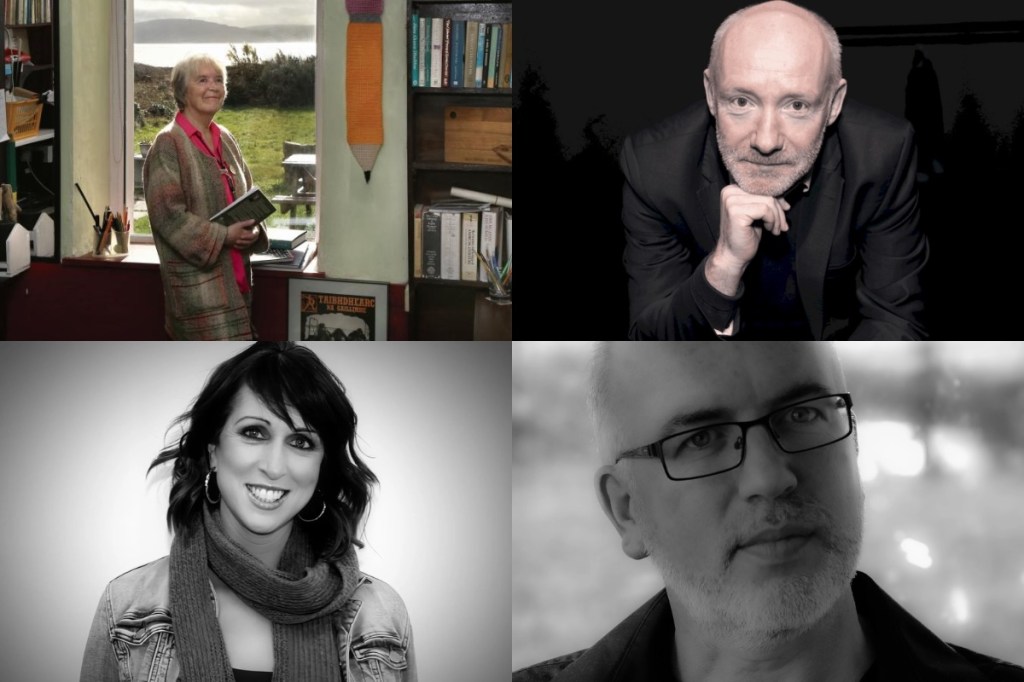There is an extended review of Count Me Out: Selected Writings of Filmmaker Bob Quinn, which I recently published, in the current issue of Cineaste magazine. Written by Darragh O’Donoghue, the review opens with the following lines about my father’s work:
Continue readingThe Late Late Out-of-Date Session
First published on The Journal of Music on 12 January: https://journalofmusic.com/reviews/late-late-out-date-session
At the end of the Late Late Show Trad Special on RTÉ One on Friday evening (9 January), the host Patrick Kielty presented Dónal Lunny with the show’s inaugural Trad Music Hall of Fame Award. From the beginning of this now annual television special, a large group of fifteen renowned musicians had been playing and singing centre stage, and Lunny joined them for the final set, the reels ‘The Green Groves of Erin’ and ‘The Flowers of Red Hill’, from the Bothy Band’s first album. It was at this moment that the show redeemed itself. Celebrating Lunny is important, no matter if it’s for the second time, following his RTÉ Radio 1 Folk Awards Lifetime Achievement Award last year. The show ended on a high.
But what had been happening up until then was troubling.
Continue readingAn Evening of Music Scene Interviews
Tomorrow at the Róisín Dubh in Galway (Friday 9 January, 6.30pm), I will be participating in Hope Collective and Irish Pop Archive’s ‘Document – An Evening of Music Scene Interviews’. Find out more here: https://roisindubh.net/listings/torann-document-2026-01-09-180000-80769
A Letter from the Editor on the 25th Anniversary of The Journal of Music
The inaugural issue was published in the first week of November 2000.
Published in The Journal of Music on 4 November 2025.
Dear Reader,
Some of you have been with me since the beginning. For others, this may be the first piece you have read from this publication. For the past twenty-five years, The Journal of Music has been documenting and discussing music in Ireland. One never knows the impact of this work, and it is not easy in the current media environment, but I would be concerned were it not there.
Continue readingCatherine Connolly Was There for Artists When It Mattered – Heather Humphreys Was Not
Published in The Journal of Music on Monday 13 October 2025.
In July 2014, Heather Humphreys was appointed Minister for Arts, Heritage and the Gaeltacht. Six years after the economic crash, it remained a grim time for artists. The Arts Council budget had been cut for seven consecutive years, from €83m in 2007 to €56.7m in 2014 – a 32% drop and a complete stripping back of the arts and music ecosystem. A few months beforehand, the then Director of the Arts Council, Orlaith McBride, had said that, for artists, this period was about ‘a fundamental issue of survival’.
Continue reading‘Count Me Out’ in Sight & Sound Magazine
Count Me Out: Selected Writings of Filmmaker Bob Quinn, edited by Toner Quinn and published in February of this year, was selected as one of Sight & Sound magazine’s summer reading recommendations in the latest issue. Here’s what Reviews Editor Kate McCabe had to say:
Continue readingEalaíontóirí Cónaithe i Stiúideo Cuan 2025 / Artists in Residence at Stiúideo Cuan 2025

Tá áthas orm a rá go bhfuil mé i measc na nEalaíontóirí Cónaithe i Stiúideo Cuan do 2025, in éineacht leis an amhránaí Mairéad Ní Fhlatharta, an t-aisteoir Diarmuid de Faoite agus an file Máire Holmes. Thosnóidh an tsraith imeachtaí ar an Déardaoin, 2 Deireadh Fómhair, ag 8 i.n., agus leanfaidh siad ar aghaidh gach Déardaoin go Nollaig. Tá fáilte roimh chách agus tá cead isteach saor in aisce. Tuilleadh eolais anseo: https://journalofmusic.com/news/stiuideo-cuan-announces-2025-artists-residence
Living in a Walshe World
A review of Jennifer Walshe’s MARS opera at the Galway International Arts Festival (25 July 2025).
Oil spills as the ejaculate of God, birthing colonies on Mars, women without children being ‘virtualised’ so they are dead to everyone but themselves. These are some of the imaginings in Jennifer Walshe’s MARS, her first large-scale collaboration with Irish National Opera following the 2021 micro-opera Libris Solar and a range of other dramatic works. It is also the latest in a series of significant contemporary operas at the Galway International Arts Festival, following Donnacha Dennehy’s The Second Violinist (2017) and The First Child (2021) and Brian Irvine’s Least Like the Other (2019).
Continue readingAgallamh le Toner Quinn ar an bpodchraoladh Seachtain ón Irish Independent
Labhair Toner Quinn le Tessa Fleming ar an podchraoladh Seachtain ón Irish Independent, faoi smaointe radacacha Desmond Fennell. Éist leis anseo.
Continue readingIrish Times Review of ‘The Radical Thinking of Desmond Fennell’
The Irish Times has published a review (12 July) by Andrew Lynch of The Radical Thinking of Desmond Fennell, edited by Toner Quinn and Jerry White.
Continue reading